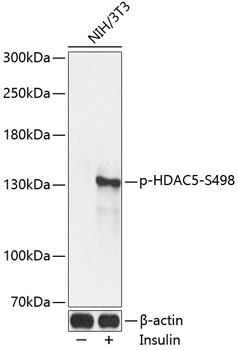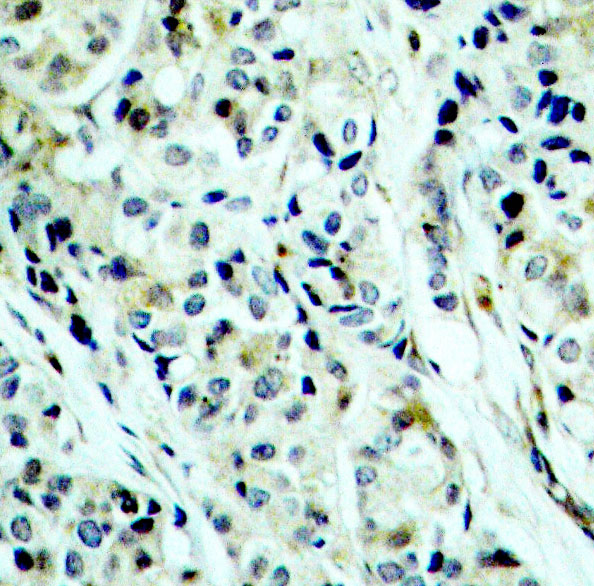-
Product Name
Phospho-HDAC5-S498 pAb
- Documents
-
Description
Polyclonal antibody to Phospho-HDAC5-S498
-
Tested applications
WB, IHC
-
Species reactivity
Human, Mouse, Rat
-
Alternative names
HDAC5 antibody; HD5 antibody; NY-CO-9 antibody; histone deacetylase 5 antibody
-
Isotype
Rabbit IgG
-
Preparation
Antigen: A phospho specific peptide corresponding to residues surrounding S498 of human HDAC5
-
Clonality
Polyclonal
-
Formulation
PBS with 0.02% sodium azide, 50% glycerol, pH7.3.
-
Storage instructions
Store at -20℃. Avoid freeze / thaw cycles.
-
Applications
WB 1:500 - 1:2000
IHC 1:50 - 1:100 -
Validations

Western blot - Phospho-HDAC5-S498 pAb
Western blot analysis of extracts of NIH/3T3 cells, using Phospho-HDAC5-S498 antibody at 1:2000 dilution. NIH/3T3 cells were treated by Insulin (100nM) for 10 minutes after serum-starvation overnight.Secondary antibody: HRP Goat Anti-Rabbit IgG (H+L) at 1:10000 dilution.Lysates/proteins: 25ug per lane.Blocking buffer: 3% BSA.Detection: ECL Enhanced Kit .Exposure time: 30s.

Immunohistochemistry - Phospho-HDAC5-S498 pAb
Immunohistochemistry of paraffin-embedded human breast carcinoma using Phospho-HDAC5-S498 antibody .
-
Background
Responsible for the deacetylation of lysine residues on the N-terminal part of the core histones (H2A, H2B, H3 and H4). Histone deacetylation gives a tag for epigenetic repression and plays an important role in transcriptional regulation, cell cycle progression and developmental events. Histone deacetylases act via the formation of large multiprotein complexes. Involved in muscle maturation by repressing transcription of myocyte enhancer MEF2C. During muscle differentiation, it shuttles into the cytoplasm, allowing the expression of myocyte enhancer factors. Involved in the MTA1-mediated epigenetic regulation of ESR1 expression in breast cancer.
Related Products / Services
Please note: All products are "FOR RESEARCH USE ONLY AND ARE NOT INTENDED FOR DIAGNOSTIC OR THERAPEUTIC USE"
